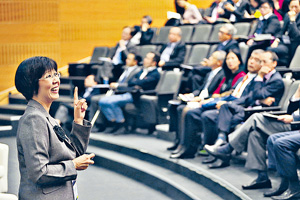
While starting a business is hard, sustaining it is harder. As the first generation endured the hardship and should retire to enjoy, leaving the front line of the business and passing the torch seems difficult.
Sunny Tan, who worked as a financial analyst at Merrill Lynch after graduation before returning to the family business in Luen Thai Holdings, shared his experience in business succession and believes that the first generation should let the second generation run the show, allowing them to make mistakes and effectively learn from them.
A research in Singapore showed that many companies overlooked the importance of succession planning. A survey was conducted by Business Family Institute of Singapore Management University from August to October this year. This survey includes responses from 83 Asian companies who have experienced intergenerational succession, of which 12% have already been through the fourth generation. The survey results showed that the whole process - from teaching the next generation business operations, professional training and experience accumulation, and to picking the right successor for succession - requires 25 years.
Professor Annie Koh, who is in-charge of the study, believes that while the first generation is busy developing the business, early training of successors tend to be neglected leading to unnecessarily long transition. In the ever changing business landscape in Asia, many thought that 25 years for succession would be too long, stifling business development.
The Handover process of trial and error and run-in
Tan Siu Lin, the founder of the world's largest clothing manufacturer Luen Thai Holdings parent Luen Thai Group, has been operating for nearly 50 years. At the age of 83, he had long reached the retirement age. Most of the business operations are currently run by his son who took over control of the business. Tan Sunny, the Chief Financial Officer of Luen Thai Holdings Limited is the youngest son in the family. Upon graduation with a Master’s degree, he joined investment bank Merrill Lynch (Asia Pacific) Ltd. as a financial analyst. He then returned to his family to help out the business after much discussion.
Joining Luen Thai for 14 years, Sunny described that intergeneration transition is a trial and error process, with continuous exploration and run-in with his father and elder brother. Recalling the time when he joined the company, there was not even a human resource department. They rely on a fax machine to send and retrieve documents. Comparing the large difference in work environment with large investment banks, "family businesses may not have the size, but over the years of frugal management, seizing opportunities when they come and effective implementation, the young generation have much to respect and follow. "
Father and children do not learn to cooperate responsibly
Young people are spirited and full of energy. Sunny, who is used to having a career out of the family, said with a smile “When I first joined the company, I was ‘bursting’ with self-confidence. Sunny believes that the young successor should distinguish between "father and son" and "supervisor and subordinate". The family relationship should be the priority, and must not disrupt the harmony because of work-related maters. More importantly, one must learn to listen to the advice, "Don’t just do as you wish, one must learn to listen to the views of others."
Sunny said with a smile, that to accelerate the younger generation taking over, father and son must responsibly cooperate in the company. In fact they should, as the Chinese saying goes, “exchange sons, one teaching the son of the other”. Otherwise, it will be difficult for the children to learn to be responsible and accountable.
"My 3-year experience in Merrill Lynch allowed me to grow tremendously, because you have no back-up and you will be scolded when you commit mistakes.” He added with a smile, that during his early days, there was an instance when he wrote a mail for his supervisor and submitted the mail without double checking. The supervisor reprimanded, "Why are you letting me sign this without even taking a look at it?" This was the first time that he learnt about responsibility.
Many fathers will allow sons who newly join the business to take on the post as assistant of the Chairman to allow them to learn. However, Sunny think that this is not the best way to learn, because as assistant of the Chairman only helps the son to learn about the business operations, and after a short time, the easier and non-core activities. “Quoting, stocking and everything else should be learned. It would be best if he faces problems and difficulties. Allowing the young generation to commit mistakes and learn from them give them added sense of responsibility."
Translated from http://www.hket.com/eti/article/d815fac3-2af4-4ac8-be33-cdda0bbbb418-964939?section=011